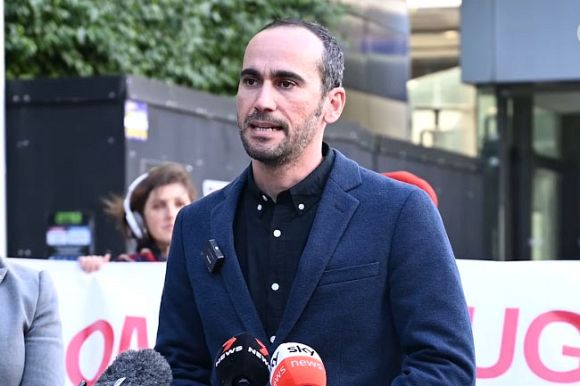Behind closed doors, the Albanese Government has replaced one form of outsourced violence with another. Dr Binoy Kampmark reports.
IT BEGAN with the colourful confessions of former Australian Army rifleman Oisin Donohoe. In a report published in The Age on 8 November, Donohoe made salty allegations that the private security intended for overseeing “unlawful noncitizens” transferred from Australia to Nauru would be staffed by members of the Finks outlaw motorcycle gang.
He stated:
“It was pretty confronting to know that an outlaw motorcycle group was running a company that had got a government contract."
It was “mind-boggling” that such figures could participate in a “contract to oversee quite a significant national security item on the agenda.”
This was certainly taking the privatisation of security, a policy already revolting in its harm and depravity, to another order. Safe Hands Security, the labour-hire company responsible for recruitment, is steered by the Finks gang leader Ali Bilal and generously staffed by members of his bikie gang. Since February, the company has been negotiating with Nauru Community Security, the entity responsible for providing escort to the Nauru Regional Processing Centre in the form of a Quick Reaction Team (QRT).
According to Donohoe, no security clearance was needed for recruits, while Australian Federal Police were engaged in logistical matters relating to the transfers. Furthermore, he has evidence that Bilal was directly overseeing recruitment for the QRT.
In further bruising revelations for the Australian government, a second whistleblower, Assistant Secretary of Home Affairs Derek Elias, has shown how rotten the awarding and implementing of contracts regarding offshore detention has been. This decay was already noted in a 2023 investigation by The Age, The Sydney Morning Herald and 60 Minutes. A snaking money trail could be found slithering from the Home Affairs Department, only to terminate in the form of oily payments to businesses controlled by Nauru’s politicians. A good number benefited, including the resourceful current President David Adeang.
Risking public prosecution for disclosing protected information, Elias is eminently qualified to comment on this canker, having overseen the contract regime from 2019-2021. In an interview with 60 Minutes, he notes the rampant abuse of taxpayer dollars on inflated contracts, the payment for services never delivered, and expenditure on such luxury assets as mansions, yachts and art by unscrupulous contractors.
This grotesque résumé did nothing to stop Nauru being promised Australian largesse to the sum of $2.5 billion to resettle a cohort of designated “unlawful citizens” who could not be indefinitely held in Australian detention. That shady understanding was reached between the Home Affairs Minister Tony Burke and a most eager President Adeang. Till that point, penal purgatory had been an Australian specialty for those arriving by boat without the lauded, legitimising paperwork. Then came the 2023 High Court decision in NZYQ which made it clear, much to the disgust of lawmakers, that holding refugees or asylum seekers without being able to return them to their countries of origin, or find resettlement in a third country, could not have the key thrown away. A vital, punitive arm of Australian refugee policy had been amputated by judicial fiat.
Releasing such individuals was the last thing either the Labor government or the Liberal-National coalition wished for. Incidents of recidivism were given bloated coverage. Those who had committed no offences were bundled together in the bilious rhetoric of hysteria. How, then, to get rid of them? A reliably venal vassal state famous for phosphate was ready and willing. The Australian Commonwealth was also eager to run roughshod over procedural fairness. The Albanese government duly amended the Migration Act in August to enable the deportation of noncitizens without notice or a right to appeal, supplementing existing, draconian machinery introduced in 2024 to jail those refusing to cooperate in their own deportation.
Sly and surreptitious, Canberra began the process of revitalising the Pacific outpost that has periodically served its sadistic ends since 2001, seemingly indifferent to the recommendations made by former domestic intelligence spy chief Dennis Richardson in his October 2023 review of regional processing arrangements. (An unclassified version of the report was released in February 2024). The payments are intended to come in the form of an initial sum of A$408 million followed by A$70 million worth of annual payments made over the course of 30 years. Finks promises to feature most prominently in this.
Nauru has also become an absurdly outgrown feature of Australia’s fixation with Chinese influence in the South Pacific. The Nauru-Australia Treaty of December 2024 reads like an open chequebook for the acquisitive Adeang and his grasping cronies. Australia, for instance, promises support for the Pacific island’s “economic resilience, fiscal stability and prosperity”, critical infrastructure such as “sustainable banking services”, collective security and “consultation on Nauru’s security and defence-related needs.” Such undertakings are done with a haughty caveat: that Australia can veto the involvement of any foreign power regarding Nauru’s critical infrastructure and security.
Given these considerations, Donohoe is adamant that Canberra’s professed ignorance regarding bikie involvement in the offshore detention system is unsustainable.
“I don’t think there’s any way possible they [the federal government agencies] didn’t know.”
The matter looks worse given his complaints to the Australian Tax Office, the Australian Securities and Investments Commission and the Australian Federal Police. And despite knocking at the door of senior Australian politicians on both sides of the aisle, only one, Jacqui Lambie, expressed a willingness to put questions to parliament.
The Home Affairs Department is playing Pilate in all of this, denying the existence of any contracts with Safe Hands. (The name is frightfully apposite.) With hand washing vigour, the department claims that there is no link between the refugee deal and the security arrangements being put in place on Nauru.
Private contractors tend to be the quotidian thugs of refugees and asylum seekers; having bikie gangs run the odious show may be a distinction without a difference. Organised crime long offered its attractions for government agencies, and courting its members so blatantly has its gruesome logic. But the Albanese Government, again shown to be callous and injudicious, prefers secrecy. Referring the matter to another secretive body, the National Anti-Corruption Commission (NACC), will serve the cause of opacity further.
Dr Binoy Kampmark was a Cambridge Scholar and is a lecturer at RMIT University. You can follow Dr Kampmark on Twitter @BKampmark.
 This work is licensed under a Creative Commons Attribution-NonCommercial-NoDerivs 3.0 Australia License
This work is licensed under a Creative Commons Attribution-NonCommercial-NoDerivs 3.0 Australia License
Support independent journalism Subscribe to IA.

Related Articles
- Medical evidence steps up campaign to end Nauru
- Taking a stand on media freedom in the Pacific
- 'Worse than death' Nauru: A mother's story
- Nauru manoeuvres













